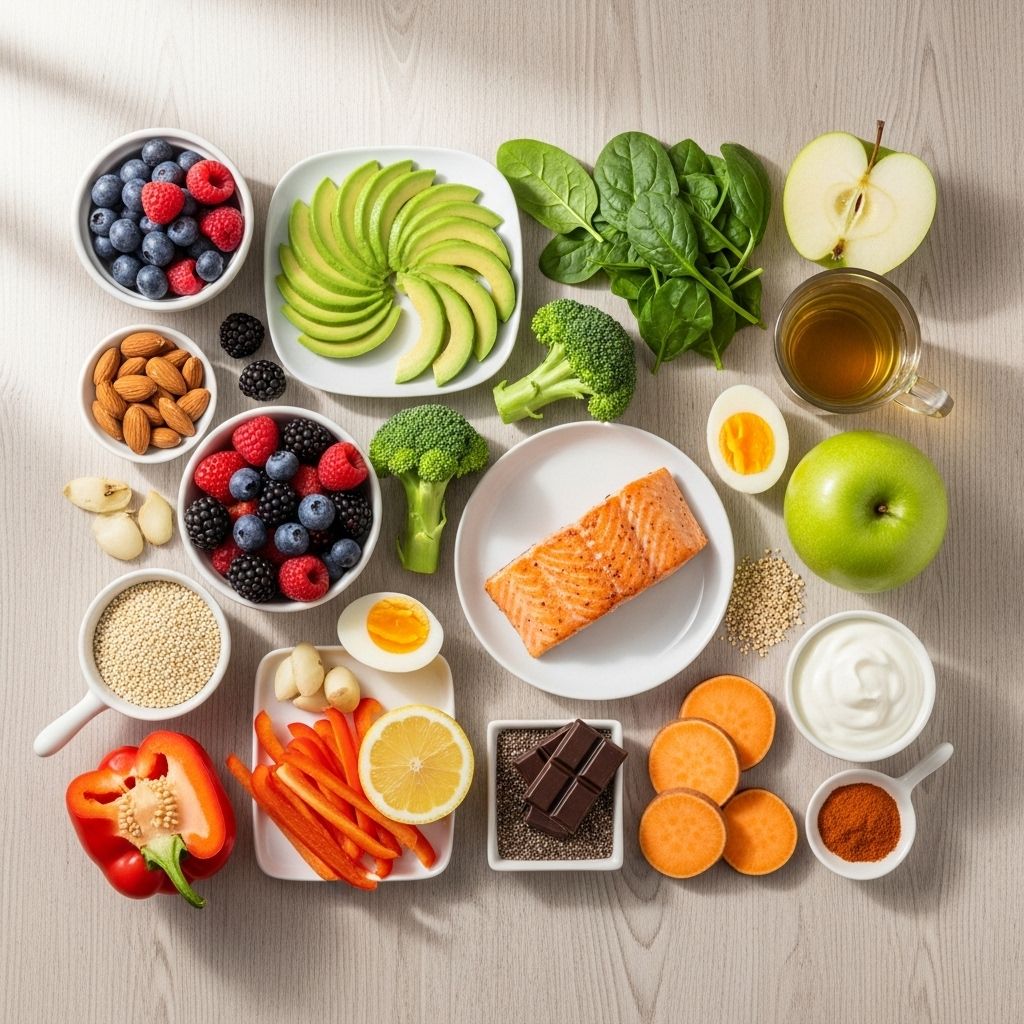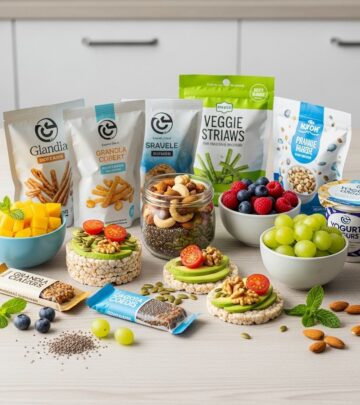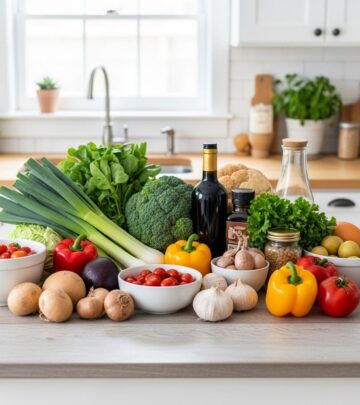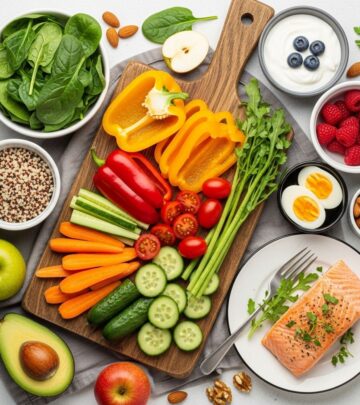17 Best Foods to Help Burn Belly Fat and Support Weight Loss
Wholesome, fiber-packed picks designed to curb cravings and support smoother digestion.

Shedding stubborn belly fat is a common health goal, but the right approach often goes beyond just cutting calories—it involves choosing foods that nourish, satisfy, and support long-term wellness. According to registered dietitians and nutrition experts, certain foods are especially effective at reducing bloating, increasing satiety, and making it easier to manage weight.
Below, discover the 17 best foods that support your journey to a trimmer waist and better health, along with practical eating tips and advice for sustainable success.
What Foods Help Burn Belly Fat?
It’s important to clarify that there is no single magic food that will instantly melt belly fat. However, adding more wholesome, unprocessed foods rich in fiber, healthy fats, and lean protein can help ease bloating, reduce calorie intake, and support weight management. These foods can also help reduce visceral fat—the deeper abdominal fat associated with metabolic risks.
- Fiber-rich foods (like oats, beans, and many vegetables) help keep you fuller, regulate digestion, and curb excessive snacking.
- Healthy fats (like those in avocados and nuts) increase satiety and provide essential nutrients.
- Hydrating foods (such as cucumber and asparagus) help flush excess sodium and reduce abdominal bloating.
Tip: When increasing fiber, always drink plenty of water to aid digestion and prevent discomfort.
1. Avocados
Rich in monounsaturated fats and packed with fiber, avocados are a nutrient-dense superfood. A daily serving can increase satiety and has been shown in studies to support weight loss when included as part of a calorie-controlled diet. Portion size matters, but even a small amount of avocado can leave you feeling full. Enjoy avocado mashed on toast, cubed in salads, or blended into dressings.
2. Asparagus
Asparagus offers a crunchy, low-calorie option with just three calories per spear. It’s naturally rich in water and fiber, making it excellent for digestion and reducing bloating. Asparagus also acts as a prebiotic, feeding the healthy bacteria in your gut. For the best texture, try air-frying or roasting rather than boiling, and enjoy with lemon or as a veggie dipper.
3. Oats
Oats are a classic high-fiber breakfast choice that keeps you full throughout the morning. The soluble fiber in oats can help reduce cholesterol and decrease visceral fat when part of a balanced diet. Choose old-fashioned or steel-cut oats for maximum health benefits, and top with berries and a handful of nuts for extra fiber and healthy fats.
4. Greek Yogurt
With a high protein content and probiotics for gut health, Greek yogurt is a smart pick for curbing appetite and supporting digestion. Opt for unsweetened varieties, and sweeten naturally with fresh fruit. Greek yogurt also makes a creamy base for smoothies, parfaits, and savory dips.
5. Berries
All types of berries—strawberries, blueberries, raspberries, and blackberries—are loaded with antioxidants, vitamins, and soluble fiber. They help control blood sugar, reduce inflammation, and satisfy sweet cravings in a low-calorie package. Enjoy berries as a snack, on oatmeal, or blended into smoothies.
6. Green Tea
Green tea contains metabolism-boosting catechins and caffeine, both of which have been associated with increased fat burning in some studies. It’s naturally low in calories and can serve as a refreshing beverage to keep you hydrated without added sugars. Aim for unsweetened brewed green tea for the best benefits.
7. Leafy Greens
Vegetables like spinach, kale, arugula, and Swiss chard provide ample fiber and essential vitamins with very few calories. Their high-water content helps you feel full, reducing the likelihood of overeating. Leafy greens are incredibly versatile—toss them in salads, stir-fries, omelets, or smoothies.
8. Beans and Legumes
Beans, lentils, and chickpeas are powerhouse sources of plant protein, fiber, and minerals. They take longer to digest, helping you feel satisfied and keeping blood sugar stable. Beans can easily be added to soups, salads, stews, and veggie burgers.
9. Eggs
Eggs are a source of high-quality complete protein, with all the essential amino acids and plenty of choline (which may impact metabolism). Multiple studies show that eggs can promote fullness and support weight loss, especially when eaten for breakfast. Enjoy them boiled, poached, or scrambled with veggies for a nutrient-packed meal.
10. Salmon and Fatty Fish
Fatty fish like salmon, sardines, and mackerel deliver omega-3 fatty acids, which regulate inflammation and improve metabolic health. These fish are also rich in protein, supporting muscle maintenance during weight loss. Serve grilled, baked, or as part of a salad or grain bowl.
11. Nuts and Seeds
While energy-dense, nuts and seeds provide heart-healthy fats, fiber, protein, and minerals such as magnesium and potassium (which help counter bloating from sodium). Almonds, walnuts, chia seeds, and pumpkin seeds make excellent snacks. Mind portion sizes—a small handful delivers satisfaction without excess calories.
12. Bananas
Often misunderstood, bananas are an excellent source of potassium, which helps balance fluids and reduce bloating. Their prebiotic fibers feed good gut bacteria. Combine with a protein like nut butter for a satisfying, bloat-busting snack.
13. Fermented Foods
Foods like kimchi, sauerkraut, yogurt, and kefir are rich in probiotics, which help maintain a healthy digestive system and may reduce abdominal discomfort. Include a serving daily to keep your gut flora balanced, which supports better nutrient absorption and regularity.
14. Whole Grains
Quinoa, brown rice, barley, and farro are unrefined grains high in fiber and protein. Unlike refined grains, they prevent rapid blood sugar spikes and keep you satisfied for longer, supporting overall calorie control.
15. Cucumber
With a very high water content and minimal calories, cucumbers help reduce water retention and flush excess sodium. Slice into salads or serve as a crunchy dipper for hummus.
16. Sweet Potatoes
Sweet potatoes are rich in potassium, fiber, and slow-digesting carbohydrates. They can satisfy carb cravings while providing sustained energy, making them a perfect base for meals. Bake, roast, or microwave for easy preparation.
17. Watermelon & Other Melons
Low in calories but high in water, watermelon and other melons can help you feel full and hydrated. Citrulline and antioxidants in watermelon also support healthy circulation and may aid in reducing post-workout soreness.
Bonus: Olive Oil
Swapping saturated fats for heart-healthy monounsaturated fats like extra-virgin olive oil in your meal prep can improve fullness and support cardiovascular health. Use for salad dressings, drizzling over veggies, or light sautéing.
Table: Bloat-Busting and Fat-Fighting Foods at a Glance
| Food | Key Benefit | Main Nutrients |
|---|---|---|
| Avocado | Satiety, healthy fats, gut health | Fiber, potassium, vitamin E |
| Asparagus | Reduces bloating, prebiotic fiber | Folate, fiber, vitamin K |
| Oats | Appetite control, digestion | Soluble fiber, iron |
| Greek Yogurt | Protein, gut health | Protein, probiotics, calcium |
| Berries | Antioxidants, anti-inflammatory | Vitamin C, fiber, polyphenols |
| Green Tea | Metabolism boost | Catechins, caffeine |
| Leafy Greens | Low-calorie, full of nutrients | Fiber, vitamin A, magnesium |
| Beans/Legumes | Satiety, fiber, plant protein | Protein, fiber, iron, magnesium |
| Eggs | Protein, choline | Protein, choline, vitamin D |
| Fatty Fish | Omega-3s, lean protein | Protein, omega-3 fats, vitamin D |
| Nuts/Seeds | Healthy fats, bloat control | Monounsaturated fats, magnesium, vitamin E |
| Bananas | Potassium, bloat reduction | Potassium, vitamin B6, fiber |
| Fermented Foods | Gut health and digestion | Probiotics, vitamins |
| Whole Grains | Sustained energy, fullness | Fiber, protein, B vitamins |
| Cucumbers | Hydration, bloat reduction | Water, vitamin K |
| Sweet Potatoes | Satisfying carbs, potassium | Beta carotene, fiber, potassium |
| Melons | Hydrating, sweet snack | Water, vitamin C |
| Olive Oil | Healthy fats, fullness | Monounsaturated fats, vitamin E |
Healthy Eating Tips for Targeting Belly Fat
- Enjoy three balanced meals and two small snacks daily to prevent hunger-driven overeating.
- Limit processed foods high in added sugars, sodium, and unhealthy fats.
- Prioritize lean protein and fiber-rich carbs with every meal.
- Stay hydrated—fluid helps your body process fiber and manage bloating.
- Don’t skip meals: Going long hours without food can slow your metabolism and increase future cravings.
- Manage stress: Chronic stress can disrupt hormones that control appetite and fat storage.
Frequently Asked Questions (FAQs)
Are there any foods that directly burn belly fat?
No single food can “burn” belly fat on its own. However, diets rich in fiber, healthy fats, and protein can help regulate appetite, digestion, and metabolism, making it easier for the body to mobilize and reduce fat, including in the abdominal area.
Which nutrients are important for reducing abdominal bloating and fat?
Fiber (soluble and insoluble), potassium, magnesium, and probiotics are all important for reducing bloat and supporting a healthy digestive system. Staying hydrated and minimizing added sugars and sodium are also helpful.
How can fiber help in losing belly fat?
Fiber slows digestion, prolongs feelings of fullness, and can decrease overall calorie intake. Some research suggests that increased soluble fiber is associated with a reduction in visceral fat—the “deep” fat in the abdominal area.
Do I need to avoid all fats if I want to lose belly fat?
No. Healthy fats from foods like avocados, nuts, seeds, and olive oil are essential for hormone balance and satiety. Focus on unsaturated fats and avoid trans and most saturated fats.
How do I incorporate these foods into my diet?
Start with small swaps—add berries to your breakfast, use leafy greens as a base for lunch, or top oatmeal with nuts and seeds. Include fatty fish or beans in dinner recipes a few times each week, and snack on yogurt or fruit-based options instead of processed snacks.
Expert Insight
Valerie Agyeman, RDN, a women’s health dietitian, emphasizes that sustainable weight loss is not about quick fixes but building a pattern of eating nutrient-rich whole foods, staying active, managing stress, and getting enough sleep. Combining these top foods with healthy habits gives the best chance for lasting results and a healthier waistline.
References
- Randomized study on avocado consumption and weight loss
- Research on dietary fiber and abdominal fat reduction
- Nutritionists’ recommendations for healthy fats and satiety
References
- https://www.goodhousekeeping.com/health/diet-nutrition/g781/belly-fat-foods/
- https://www.womenshealthmag.com/food/g18923794/best-fat-burning-foods/
- https://www.goodhousekeeping.com/health/diet-nutrition/advice/a17162/lose-weight-faster-karas-0302/
- https://www.scribd.com/document/542115800/Good-Housekeeping-Best-Diets-for-Easy-Weight-Loss
- https://www.beaumontenterprise.com/life/health/article/Good-Housekeeping-7-salad-bar-fat-traps-4693330.php?forceWeb=1
- https://www.walmart.com/ip/Good-Housekeeping-400-Flat-Tummy-Recipes-Tips-9781618372383/385765651
- https://globesecure.co.in/?v=13676219021990&mod=db4d9c25&uri=news.php%3Fid%3D457723-333%26name%3Dhealthy+snacks+best+food+for+tummy+fat+loss
Read full bio of Sneha Tete












